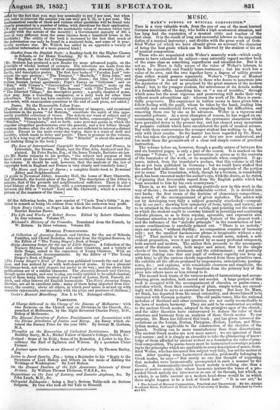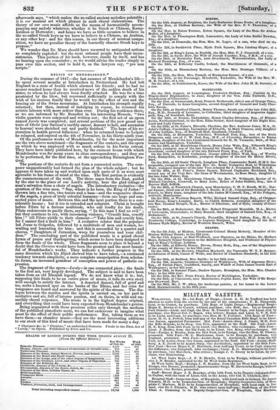MUSIC.
MART'S SCHOOL OF MUSICAL COMPOSITION.•
Tins is a very valuable work, from the pen of one of the most learned German musicians of the day, who holds a high academical situation, and
has long had the reputation of a musical critic and teacher of the
first class. It is the result of long and successful labours in the important duties of a musical instructor ; and divides with the great work of Gott- fried Weber (of which we have already given an account) the character of being the best guide which can be followed by the student of the art of musical composition.
Those who are acquainted with Weber's masterly work—which really seems to have exhausted its subject—may naturally regard another book of the same class as something superfluous and uncalled-for. But it is not so. Dr. Marx is fully aware of the value of Weber's labours, to which he repeatedly and frankly bears testimony ; but his work has a value of its own, and the two together have a degree of utility greater than either would possess separately. Weber's " Theory of Musical Composition " is indeed invaluable to those who desire to penetrate into the mysteries of the art as practised by the great masters of the modern school; but, to the younger student, the minuteness of its details makes it a formidable affair, launching him on "a sea of troubles," through which none but the most vigorous and persevering will make their way
without much adventitious aid : whereas the work of Dr. Marx is essen- tially progressive. His experience in tuition seems to have given him a fellow-feeling with the pupil, whom he takes by the hand, leading him
carefully and considerately forward, comprehending his difficulties, and removing them one by one as he advances. Weber is a vigorous and
successful polemic. As a atout champion of reason, he has waged an ex-
terminating war of sound logic against the systematic absurdities which have prevailed down to the present day, and has cleared away mountains of pedantic rubbish which have encumbered the path of musical science. But with these controversies the younger student has nothing to do, but only with their results. So the matter has been regarded by Dr. Marx; who has taken the principles of music as they are now understood, and has made them the groundwork of a clear and simple course of practical instruction.
The volume before us, however, though a goodly octavo of between five and six hundred pages, is only a part of the course. It is marked on the titlepage "Volume I." ; and no information is given as to the contents
of the remainder of the work, or its magnitude when completed. It ap- pears, indeed, from the translator's preface, that this volume is all that has as yet been published in Germany but we could have wished that
the author had indicated the contents and the magnitude of the portion yet to come: The translation, which, though by a German, is remarkably good, has been executed under the author's eye, with the desire, as he states, "of gaining that favourable regard from the English public which has been accorded to him by his own countrymen."
There is, as we have said, nothing positively new in this work in the way of theory ; its merit lies in its admirable method. It is divided into two books the first treats of the doctrine of elementary composition ; the second, of the accompaniment of given melodies. The author sets out by developing very fully a subject generally overlooked—composi-
tion in one part; showing how symmetry of form, unity, and variety, are
to be attained in the construction of melody, and pointing out the mannex in which the student ought to exercise himself in inventing and combining
melodic phrases, so as to form regular, agreeable, and expressive airs.
Constant attention to melody is a peculiar feature of the present work ; and the influence of the "melodic principle" in the construction of har-
monic combinations is carefully pointed out. "There is no melody," says our author, "without rhythm; no composition consists of harmony only ; not the smallest harmonious phrase is imaginable without a me- lody." That melody is the soul of music, would seem, indeed, a self- evident proposition, were it not ignored by so many profound composers, both ancient and modern. The author then proceeds to the accompani- ment of the diatonic scale, both major and minor, first by the simple
chords of the tonic, the dominant, and the subdominant ; and gradually advances (taking care that any pupil of ordinary capacity can keep up with him) to all the various chords engendered from those primitive ones. He exhibits all the effects produced by suspensions, anticipations, passing- notes, &c. ; and explains, with remarkable clearness and simplicity, the principles of modulation, or the transition from the primary key of the piece into others more or less related to it.
The second book treats of the various modes of harmonizing and accom- panying given melodies, both sacred and secular. A large portion of this book is occupied with the accompaniment of chorales, or psalm-tunes ; melodies which, from their consisting of plain, simple notes, are exceed- ingly well fitted to serve as exercises in harmony. But here Dr. Marx, we think, has departed from his usual rationality, and shows himself to be tinctured with German pedantry. The old psalm-tunes, like the national melodies of Scotland and other countries, are not easily reconcileable to the laws of modern harmony. They are said to be constructed accarding to the ancient Greek modes, adopted in the primktive ages of the church ; and the older theorists have endeavoured to deduce the rules of their
structure and harmony from an analysis of those Greek modes. To our surprise, Dr. Marx has followed this track ; and has given laboured dis- sertations on the Ionian, Dorian, Phrygian, /Eolian, Lydian, and Mize- lydian modes, as applicable to the construction of the chorales of the church. Nothing can be more unsatisfactory than these dissertations. The ancient Greek modes are now mere names ; we are ignorant of their real nature ; and it is simply an absurdity to take the glimmering of know- ledge of them afforded by ancient writers as a foundation for rules of prac- tical composition. The psalm-tunes must be harmonized nowadays.accord- ing to the principles which are applicable to every description of music. Gott-
fried Weber, who has discussed this subject very fully, has set the matter at rest. After quoting some harmonized chorales, professedly belonging to
Greek modes, he says—" But surely no one has thought of supposing that melodies were harmonically accompanied in such a manner by the Greeks. A harmonically-treated Greek melody is nothing else than a piece of modern music, into whose harmonic texture the tones of a pre-
but which, as
tended Greek melody are interwoven as one of its a whole, is as little ancient as a modern head-dress wouldbe in which there might happen to be a lock of Greek hair." "It is our art," he • The School of Musical Composition, Practical and Theoretical. By Dr. Adolph Bernhard Mara, Professor of Music in the University of Berlin. Published by Cocks sal Co. • afterwards says, "which makes the so-called ancient melodies palatable; it is our musical art which pleases in such choral elaborations. The theory of our own music affords us the means of harmonically accom- panying any melody whatever, whether it be Greek or Chinese, Kamp- katakan or Hottentot; and hence we have as little occasion to believe in the so-called Greek keys as we have to believe in a Chinese, an Arabian, or any other key : and for this reason, in our theory of musical compo- sition, we have no peculiar theory of the learnedly obscure Greek keys to propose."
We wonder that Dr. Marx should have recurred to antiquated notions so completely exploded: but the most rational people have their incon- sistencies. This portion of his book, however, stands by itself, and has no bearing upon the remainder ; so we would advise the reader simply to pass over this section, and to hold it, as the lawyers say, "pro non scripto."



























 Previous page
Previous page